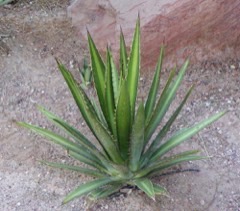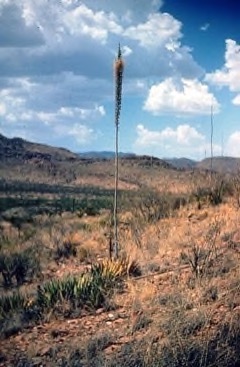 |
|
wikimedia.org Stan Shebs |
 |
| Clarence A. Rechenthin @ USDA-NRCS PLANTS Database |
Translate this page:
Summary
Lechuguilla is a long-lived, drought-tolerant perennial. Lechuguilla provides important habitat and food to a diversity of Chihuahuan Desert mammals, reptiles, and birds but is poisonous to domestic livestock.
Physical Characteristics

 Agave lechuguilla is an evergreen Perennial growing to 0.6 m (2ft) by 0.6 m (2ft in) at a medium rate.
Agave lechuguilla is an evergreen Perennial growing to 0.6 m (2ft) by 0.6 m (2ft in) at a medium rate.
See above for USDA hardiness. It is hardy to UK zone 10.
Suitable for: light (sandy), medium (loamy) and heavy (clay) soils, prefers well-drained soil and can grow in nutritionally poor soil. Suitable pH: neutral and basic (mildly alkaline) soils and can grow in very alkaline soils.
It cannot grow in the shade. It prefers dry or moist soil and can tolerate drought. The plant can tolerate maritime exposure.
UK Hardiness Map
US Hardiness Map
Synonyms
Agave poselgeri, Agave multilineata, Agave lophantha var. tamaulipasana, Agave lophantha var. subcanescens, Agave lophantha var. poselgeri.
Plant Habitats
Edible Uses
Edible Parts: Stem
Edible Uses:
The water stored in the flowering stalks of this plant, rich in salts and minerals, is sold in Mexico as a sport drink.
References More on Edible Uses
Medicinal Uses
Plants For A Future can not take any responsibility for any adverse effects from the use of plants. Always seek advice from a professional before using a plant medicinally.
Aztecs made a powerful antibiotic from a mixture of Lechuguilla juice and salt and used it as a dressing for wounds and a balm for skin infections.
References More on Medicinal Uses
The Bookshop: Edible Plant Books
Our Latest books on Perennial Plants For Food Forests and Permaculture Gardens in paperback or digital formats.

Edible Tropical Plants
Food Forest Plants for Hotter Conditions: 250+ Plants For Tropical Food Forests & Permaculture Gardens.
More

Edible Temperate Plants
Plants for Your Food Forest: 500 Plants for Temperate Food Forests & Permaculture Gardens.
More

More Books
PFAF have eight books available in paperback and digital formats. Browse the shop for more information.
Shop Now
Other Uses
Carbon farming Solutions - Industrial Crop: fiber (Crops grown for non-food uses. Industrial crops provide resources in three main categories: materials, chemicals, and energy. Traditional materials include lumber and thatch, paper and cardboard, and textiles). Agroforestry Services: living fence (Agroforestry is a land use management system in which trees or shrubs are grown around or among crops or pastureland). This species is mainly used in the fabrication of brushes and scrubbers (NatureServe 2009); the leaf fibres are used to make ropes (SpottedBird 2000). Utilization of lechuguilla fibers, soaps, foods, and drinks by southwestern people (US) was extensive historically and continues today. Lechuguilla fibers called "istles," Ixtili, or Tampico are strong and durable. Fibers were used to make ropes, twine, sacks, saddle cloths, basketry, paint brushes, sandals, hair brushes, and when formed into a cord was used in clothing construction. Lechuguilla nectar attracts hummingbirds, wasps, bees, butterflies, and beetles.
Special Uses
Carbon Farming
References More on Other Uses
Cultivation details
Agroforestry Services: Living fence Industrial Crop: Fiber Management: Standard Regional Crop
Climate: subtropical to tropical. Humidity: arid to humid. Lechuguilla is common on dry hills, plains, rocky slopes, and limestone highlands. Lechuguilla occupies habitats with semiarid continental climates. The Chihuahuan Desert averages 7.7 to 13.7 inches (196-348 mm) of annual precipitation, and summer temperatures above 100 °F (40 °C) are common. In the northern portion of the Chihuahuan Desert, precipitation averages 9.7 to 10.4 inches (245-265 mm), 70% to 80% of which falls in the summer. The average low winter temperature is 36 °F (2 °C) and mean summer high is 90 °F (31 °C). Throughout lechuguilla's range, the densest populations occur below 4,900 feet (1,500 m). Lechuguilla is shallowly rooted. The average depth is 4 inches (10 cm). It produces flowers after three to five years and dies after flowering. Threatened by deer and javelinas (peccaries) who eat it, however, it is poisonous to cattle. Carbon Farming Solutions - Cultivation: regional crop. Management: standard (Describes the non-destructive management systems that are used in cultivation) [1-1].
Carbon Farming
-
Agroforestry Services: Living fence
Simply managed rows of shrubs and trees.
-
Industrial Crop: Fiber
Clothing, rugs, sheets, blankets etc. Currently, almost none of our fiber are produced from perennial crops but could be!
-
Management: Standard
Plants grow to their standard height. Harvest fruit, seeds, or other products. Non-Destructive management systems.
-
Regional Crop
These crops have been domesticated and cultivated regionally but have not been adopted elsewhere and are typically not traded globally, Examples in this broad category include perennial cottons and many nuts and staple fruits.
References Carbon Farming Information and Carbon Sequestration Information
Temperature Converter
Type a value in the Celsius field to convert the value to Fahrenheit:
Fahrenheit:
The PFAF Bookshop
Plants For A Future have a number of books available in paperback and digital form. Book titles include Edible Plants, Edible Perennials, Edible Trees,Edible Shrubs, Woodland Gardening, and Temperate Food Forest Plants. Our new book is Food Forest Plants For Hotter Conditions (Tropical and Sub-Tropical).
Shop Now
Plant Propagation
Propagation from offshoots is the fastest and most reliable method of agave plant production. Agave are difficult to grow from seed. Seeds readily germinate but seedling establishment is rare. Temperatures exceeding 95 °F (35 °C), however, decrease germination percentages. The lack of "specialized germination requirements" may limit lechuguilla's ability to establish by seed.
Other Names
If available other names are mentioned here
lechuguilla, Maguey lechuguilla, Shin Dagger, Tampico Fiber
Native Range
NORTHERN AMERICA: United States (New Mexico (south), Texas), Mexico (Chihuahua, Coahuila de Zaragoza, Durango (east), Nuevo León, San Luis Potosí, Tamaulipas, Zacatecas (north), Hidalgo, Ciudad de México)
Weed Potential
Right plant wrong place. We are currently updating this section.
Please note that a plant may be invasive in one area but may not in your area so it's worth checking.
None Known
Conservation Status
IUCN Red List of Threatened Plants Status : Status: Least Concern

Growth: S = slow M = medium F = fast. Soil: L = light (sandy) M = medium H = heavy (clay). pH: A = acid N = neutral B = basic (alkaline). Shade: F = full shade S = semi-shade N = no shade. Moisture: D = dry M = Moist We = wet Wa = water.
Now available:
Food Forest Plants for Mediterranean Conditions
350+ Perennial Plants For Mediterranean and Drier Food Forests and Permaculture Gardens.
[Paperback and eBook]
This is the third in Plants For A Future's series of plant guides for food forests tailored to
specific climate zones. Following volumes on temperate and tropical ecosystems, this book focuses
on species suited to Mediterranean conditions—regions with hot, dry summers and cool, wet winters,
often facing the added challenge of climate change.
Read More
Expert comment
Author
Torr
Botanical References
Links / References
For a list of references used on this page please go here
Readers comment
| Add a comment |
|
If you have important information about this plant that may help other users please add a comment or link below. Only comments or links that are felt to be directly relevant to a plant will be included. If you think a comment/link or information contained on this page is inaccurate or misleading we would welcome your feedback at [email protected]. If you have questions about a plant please use the Forum on this website as we do not have the resources to answer questions ourselves.
* Please note: the comments by website users are not necessarily those held by PFAF and may give misleading or inaccurate information.
To leave a comment please Register or login here All comments need to be approved so will not appear immediately.
|
Subject : Agave lechuguilla
|
|
|
|